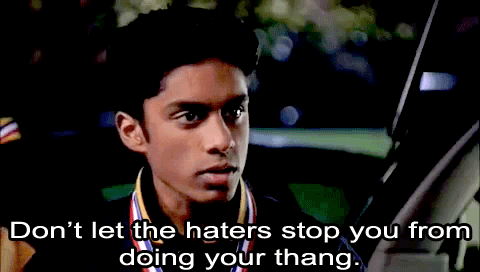1. Don't take it to heart
If it didn't work out, it wasn't meant to be. It's not you, it's them. They're not ready to commit to you. So now that we have those clichés out of the way, it's worth reminding yourself that the majority of the time, a 'no' is not a personal attack on you. If you believe you interviewed to the best of your ability, there is no point beating yourself up about it. In a time where graduates are spilling out of interviews, you will probably have faced a great deal of competition and the lucky candidate may have more experience or a more appropriate skillset. That doesn't mean you weren't 'good' enough, it just wasn't the right role for you at the time. But rather than just assuming, ask for feedback. Otherwise, you'll never know what to work on for your next interview; it might have been something small like the way you answered one question, or the employer didn't think you'd fit in well with the team. Again, it's not your fault for being you, it was just the wrong role - just like Dave, captain of the football team, was the wrong relationship for the 15 year old you.
2. Avoid assumptions
You may have thought it was the best interview in the world, just like the most perfect first date. But you can't read minds. No matter how well you think it went, don't assume you'll get the job. Yes, you might have done your best, and if your best isn't good enough, then what's the point? Well go back to point 1 if you choose to believe that. But the best approach, rather than assuming the best (and/or worst), is to be quietly confident and proud; but also prepare your gracious loser face.
3. Mistakes are meant to be learnt from
If you're able to get feedback post-interview, then listen to it. Ok, there may be a few trivial slip-ups that happened due to nerves, but hopefully the employer will be honest and in the long-run help you to understand where you might be going wrong. But do not dwell. Just like after a break-up, assess the feedback, take note of what you can improve upon (or avoid doing) and then move on. If you walk into an interview worrying about the 10 things you mustn't do, you'll forget what you should do; these are far more important.. Stay positive

While rejection can be dealt with, it will still leave you feeling tender. "There are plenty more fish in the sea" may be a valid response from friends and family, but right now, you may not want to look for a different job or go on any new dates. But you can't let your determination and confidence take these hits, or you'll worsen your chances. No matter how easy it is for us to write this: try and stay positive. Twiddling your thumbs before an interview and thinking: "This will just be another rejection" will not help - even if it saves you from potential disappointment, it is not healthy to think like this. One technique that might be better is to allocate yourself a few days to get excited and/or deal with rejection for one job, then move on and jump back onto the career-hunting horse.
5. Don't give up
Well this point speaks for itself, so again, don't lose hope. Maybe you will need to take a break from job-hunting and have some positive 'me-time' to re-boost your moral; if rocky road ice-cream helps you get over Sandra, it will work now. But giving up is not an option (do you really want to be stuck at home with your parents?). Another option is to cut back on the amount of applications you submit and therefore pace yourself. While you have a bit more free-time, be productive in other aspects of your life like catching up with family/friends and teaching yourself some new skills (read more
here).If you have any more tips for dealing with rejection from a job, please do comment below and let us know.
 While rejection can be dealt with, it will still leave you feeling tender. "There are plenty more fish in the sea" may be a valid response from friends and family, but right now, you may not want to look for a different job or go on any new dates. But you can't let your determination and confidence take these hits, or you'll worsen your chances. No matter how easy it is for us to write this: try and stay positive. Twiddling your thumbs before an interview and thinking: "This will just be another rejection" will not help - even if it saves you from potential disappointment, it is not healthy to think like this. One technique that might be better is to allocate yourself a few days to get excited and/or deal with rejection for one job, then move on and jump back onto the career-hunting horse.
While rejection can be dealt with, it will still leave you feeling tender. "There are plenty more fish in the sea" may be a valid response from friends and family, but right now, you may not want to look for a different job or go on any new dates. But you can't let your determination and confidence take these hits, or you'll worsen your chances. No matter how easy it is for us to write this: try and stay positive. Twiddling your thumbs before an interview and thinking: "This will just be another rejection" will not help - even if it saves you from potential disappointment, it is not healthy to think like this. One technique that might be better is to allocate yourself a few days to get excited and/or deal with rejection for one job, then move on and jump back onto the career-hunting horse.




